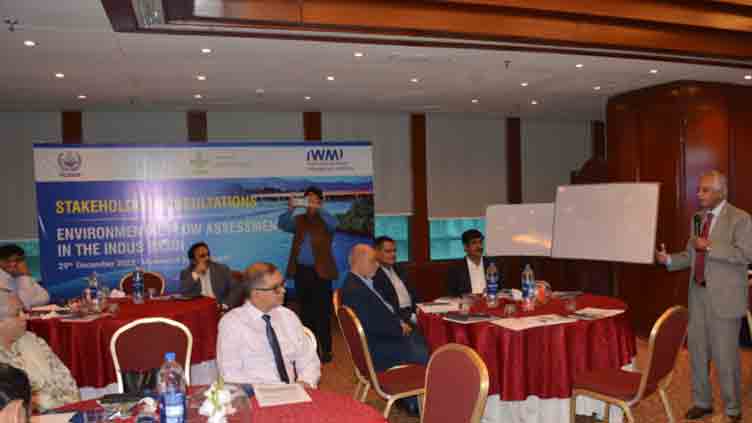CGIAR's NEXUS Gains executing strategy to tackle low water productivity in Pakistan

Pakistan
It aims at advancing SDGs by transforming the food, land, and water systems in the Indus Basin
ISLAMABAD (APP) - The CGIAR’s NEXUS Gains Initiative, in strategic partnership with the International Water Management Institute (IWMI) and the International Food Policy Research Institute (IFPRI), is executing a comprehensive strategy to address low water productivity in Pakistan.
“The primary objective of the strategy is to tackle low water productivity and advance the Sustainable Development Goals (SDGs) by transforming the food, land, and water systems in the Indus Basin,” an IWMI news release said on Wednesday.
IWMI has organized stakeholder consultation workshops at the federal and provincial levels, with participants from various government departments in Sindh, including WAPDA, DevCon, PCRWR, MUET Jamshoro, and the Planning and Development Department.
“A crucial aspect of this initiative is the Environmental Flow (E-Flow) assessment of the Indus River basin, a pivotal step toward sustainable water management,” the IWMI said. “Recognizing the pressing need for accurate data and informed decision-making, the IWMI and PCRWR teams are set to apply an environmental flow model in the Indus Basin, which aims to understand the environmental water needs for various river reaches across the eastern and western rivers in the basin,” it added.
Dr Mohsin Hafeez, Director of Water, Food & Ecosystems at IWMI, emphasized the critical nature of calculating E-Flows, stating, “We cannot manage what we don’t measure.” He highlighted the insufficient focus on E-Flow in Pakistan, citing the absence of a dedicated department and a systematic approach to acquiring data for E-Flow assessment and management in the Indus Basin.
To bridge the gap, he said the IWMI and PCRWR initiated stakeholder consultations at the national and provincial levels.
“The objective is to gather firsthand information and insights from key professionals, planners, and policymakers in the water and related sectors. This consultation aims to address crucial questions for effective E-Flow assessment and management, including understanding E-Flow requirements, identifying available datasets, evaluating existing policies, establishing prioritization at federal and provincial levels, and fostering collaboration on ongoing and planned projects,” he added.
Interactive discussions during the consultation, led by Dr. Muhammad Ashraf, former chairman of PCRWR, emphasised the need for a unified approach towards sustainable water management. The evident trust deficit between provinces highlighted the necessity for federal entities to collaborate closely with provincial stakeholders, presenting a united front to advance the water agenda.
Stakeholders anticipated several outcomes from the collaborative effort, including increased comprehension and awareness of E-Flow requisites, identification of available datasets, prioritization at federal and provincial levels, exchange of information on ongoing and planned projects, and exploration of necessary steps within the Water-Energy-Food-Climate Nexus to address E-Flow issues.
“This collective initiative aims to strengthen decision-making, promote collaboration, and establish a unified approach to effectively assess and manage E-Flow in Pakistan,” the IWMI said.


